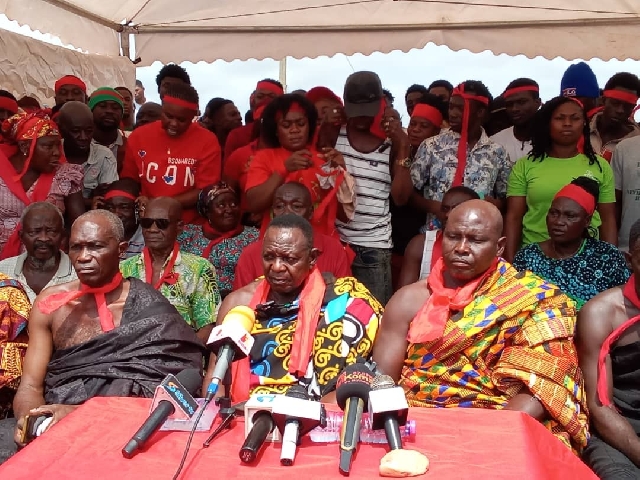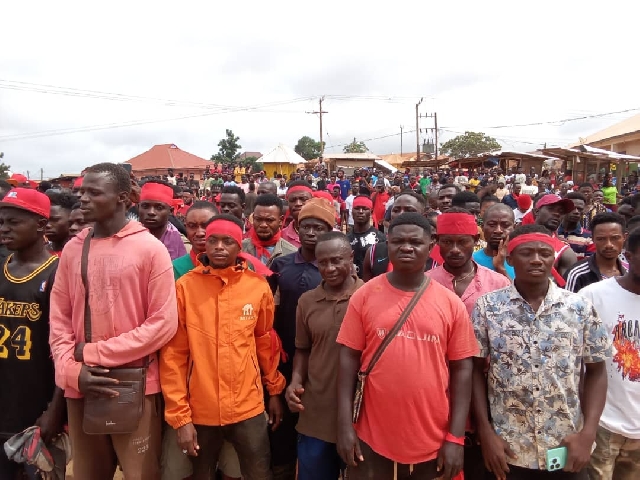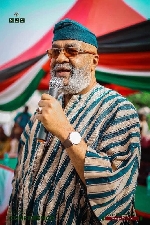Tension escalates in Manso Tontokrom over planned military deployment to disputed mining site
 Traditional leaders speakig at the press
Traditional leaders speakig at the press
Renewed tension is mounting in Manso Tontokrom, a mining community in the Amansie South District of the Ashanti Region, as residents express strong opposition to alleged plans by Asanko Gold Mines to deploy military personnel to guard a disputed mining concession.
The tension reached a boiling point on Saturday, July 26, following reports from the Amansie South District Assembly that the company had received clearance to engage the military to flush out local miners operating within the contested area.
This news triggered outrage among residents, recalling a similar operation last year that led to the deaths of three individuals.
At a press conference held by traditional leaders, the community issued a stern warning that any attempt to use state security to forcefully seize their source of livelihood would be fiercely resisted.
Addressing the media, Nana Kwaku Gyamfi II, the Asantehene’s Nkonwa Soafoamanhene, flanked by the Abusuapanin of Manso Tontokrom, Opanin Kofi Manu, and surrounded by red-clad, visibly angry youth, described the situation as intolerable.
“The people of Tontokrom are peace-loving, but we are tired of the harassment and brutalities we continue to suffer on our land,” Nana Gyamfi declared.
“Are we not Ghanaians? Don’t we deserve to work and earn a living on our land?”
He appealed to President John Mahama and the Asantehene, Otumfuo Osei Tutu II, to intervene urgently to prevent further bloodshed.
“We beg President Mahama to call the security agencies to order, and we plead with Otumfuo to use his authority to bring both parties to the negotiation table before we witness another tragedy.”
The community blames Asanko Gold Mines for escalating the conflict by deploying military and private security forces, referred to locally as “machomen,” to suppress local miners.
One of the youth leaders, speaking after the press conference, warned that the community would no longer tolerate deadly force being used against residents.
“We don’t want to bury another youth before action is taken.
If they won’t allow us to mine, they must show us an alternative.
Stop sending soldiers to beat and kill us,” he said.
Tensions between residents and Asanko Gold Mines have simmered for years, largely due to disputes over the firm’s control of concessions the locals claim to have mined for generations.
The arrival of the company and its use of armed personnel have been cited as the main source of conflict.
In one of the deadliest incidents on March 2 last year, three people were killed during violent clashes between residents and private security guards reportedly hired by the company.
According to eyewitnesses, one resident was shot dead by the armed guards, prompting a retaliatory attack from enraged youth, which resulted in the deaths of two of the guards.
Roadmap for Peace
To address the crisis, the traditional leaders have outlined a series of demands aimed at fostering a peaceful resolution.
These include:
Immediate withdrawal of all armed security personnel from the area to ease tensions.
The establishment of an independent committee of inquiry comprising representatives from the Minerals Commission, the Regional House of Chiefs, Parliament’s Mines and Energy Committee, Civil Society Organisations, and the Attorney-General’s Department to investigate past incidents and recommend compensation for victims.
The creation of a legally recognised community mining scheme for residents to reduce friction and clarify concession boundaries.
The community emphasised its willingness to seek a peaceful end to the dispute but insists that the heavy-handed tactics employed by the mining company and its security personnel must cease.
Source: Classfmonline.com/Cecil Mensah
Trending News

NAIMOS task force continues crackdown on illegal mining in Bole-Bamboi
12:56
SIC Insurance PLC donates fifty laptops to KNUST
03:10
Gov't to launch phase II of Blue Water initiative to tackle water pollution from illegal mining
15:44
Supreme Court quashes arrest warrant for Kelvin Taylor in 4-1 majority ruling
11:55
AIGS applauds President Mahama for appointing Kojo Choi as Ghana’s ambassador-designate to South Korea
12:50
President Mahama appoints Alhaji Said Sinare as Ghana’s Ambassador to the Kingdom of Saudi Arabia again
02:50
Ashanti Regional police commander pledges justice for slain Kusasi chief
13:19
Heated debate in Parliament over Mahama Care Bill as MP calls for urgent action amid Minority's pushback
11:45
Minority on quest to only entertain angry NPP supporters -Mahdi Jibril
13:03
Parliament debates controversial ‘Mahama Care’ bill to tackle chronic illness burden
11:24



